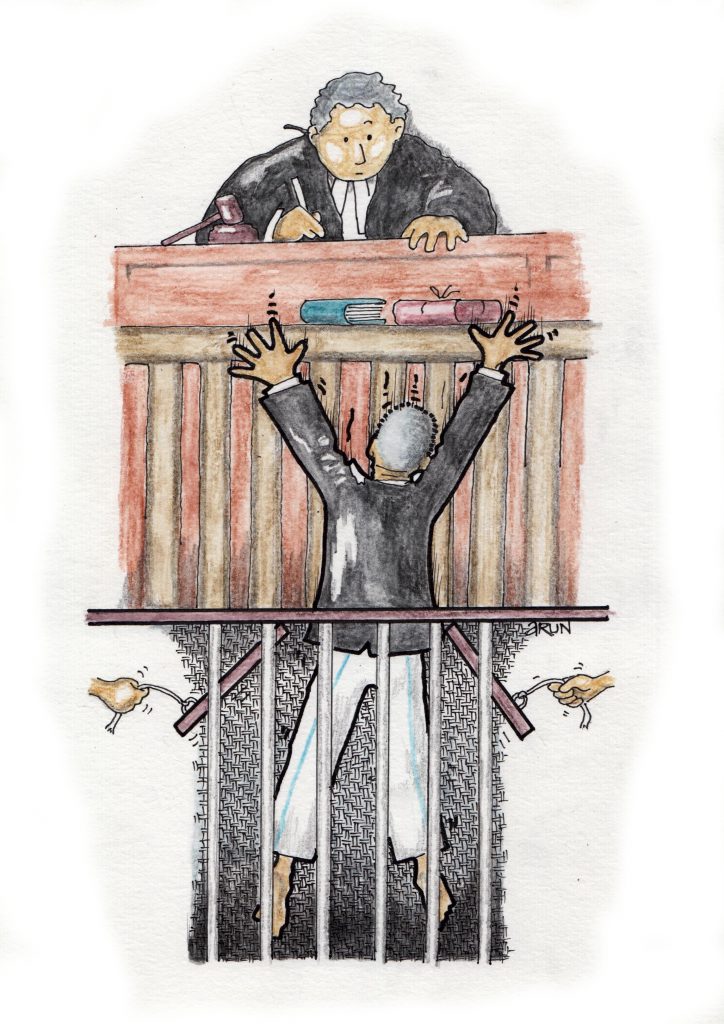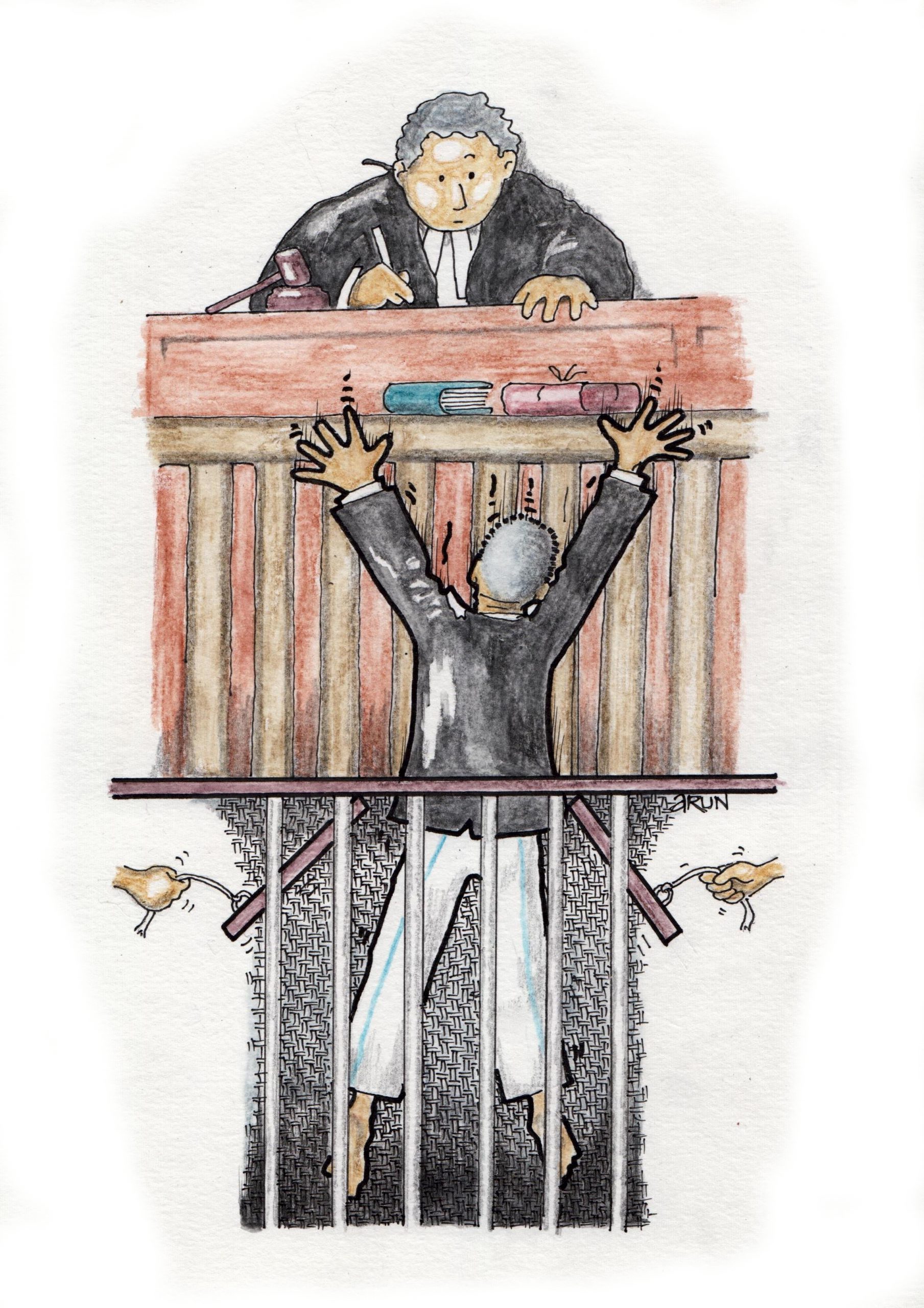
BK-16 Prison Diaries: Minal Gadling on the many cruelties, ironies and injustices of Surendra’s imprisonment

To mark six years of the arbitrary arrests and imprisonment of political dissidents in the Bhima Koregaon case, The Polis Project is publishing a series of writings by the BK-16, and their families, friends and partners. (Read the introduction to the series here.) By describing various aspects of the past six years, the series offers a glimpse into the BK-16’s lives inside prison, as well as the struggles of their loved ones outside. Each piece in the series is complemented by Arun Ferreira’s striking and evocative artwork.
6 June 2024 marked six years since Surendra was arrested. Six long years! It is very difficult to talk about this time in a few words. During these six years, life completely changed. Life, which earlier meant stability, security, friends, relatives, and happiness, was suddenly altered completely, and I found myself forced to face a reality that I could not have imagined in my worst nightmares.
I recall that grim dawn of 17 April 2018, when our house was raided; that sinister morning of 6 June 2018, when Surendra was taken away. It took an extremely long time just for me to accept that this had actually happened to me. Often, I would think that I’d get up in the morning and realise that it had all just been a bad dream. But no, it was a bitter truth that had destroyed our lives, and made me experience the dark reality of the state, the judiciary, and of society—one that I had never before contemplated.
Surendra respected Dr. Babasaheb Ambedkar a lot. Babasaheb had focused his entire life on the betterment of Dalits. He taught that it is the duty of those who acquired education to use it for the welfare of society. Grasping this message, Surendra constantly worked to help the Dalits, Adivasis, minorities and the poor. He dedicated his whole life to this cause, even neglected his family and his health on many occasions. He fought fearlessly to get them justice from the atrocities and injustices inflicted upon them.
But now, the one who always secured good outcomes in UAPA and TADA cases is now himself imprisoned under one. A Dalit lawyer following the path shown by Babasaheb is made to pay the price of being a Dalit. For walking fearlessly on the path of truth, because he stood alongside the Dalits and Adivasis in their fight for justice, he was branded an “Urban Naxal.” Today, despite being innocent, he remains cut off from his family, behind bars for six years. He could not even see his mother in her last days.
As far back as I can remember, Surendra would go above and beyond to help his clients, many of whom were Adivasis from remote and small villages of Gadchiroli and other districts, whose families could not afford even the cost of travel to visit them to provide bare necessities. Several times, I bought clothes for some female clients, who had no clothes other than those they were wearing when they were suddenly picked up. Some Adivasi clients had no money and no place to go to in the city after being released, so they would stay at our place and eat with us for one or two days, till their family members came. When such a helpful lawyer himself becomes a prisoner, life becomes hell for him.
Surendra was arrested on 6 June 2018, and on 8 June, I was informed he had been admitted to Pune’s Sassoon Hospital. I immediately left for Pune. When I reached the next day, he was in the ICU. His left hand was handcuffed to the bed, while the angiocath was inserted on his right side for the angiography. He was admitted in this way, as if he was some big, dangerous criminal.
Seeing him in this state, my condition became very bad. We were allowed to see him just once to give him medicines. He was discharged on 11 June. Until then, we were not allowed to meet him, while all expenses for medicines, treatment, blood tests were taken from us. The blood reports only came on the 11th afternoon, so we had to give the medicines without seeing the reports, and that too, not to him, but in the hands of the police. Thus, Surendra was not even aware which medicines had to be taken, in what quantity and when. It was in this way that they played with his life and sent him to jail. This goes on to this day.
Seeing Surendra’s health problems and the negligence of the prison authorities, I always worry about another Father Stan Swamy type of episode happening again. Surendra has a number of health issues, including high blood pressure, diabetes, spondylitis, asthma and cardiac problems.
In Pune, the cold is severe. Surendra has severe problem of asthma and syncope during winter. I also saw a lot of discrimination in Yerawada jail. They were branded as Urban Naxals and harassed a lot. I was not even allowed to give him a sweater, whereas, at the same time, sweaters were accepted from family members of other prisoners. When I objected to this, they claimed it could be a tool for suicide. It was only after constant struggle and a court order that the basic requirements of a sweater and blanket were allowed.
He faced similar discrimination in Taloja Jail of Navi Mumbai. Seeing Surendra’s health problems, the doctor had directed that he be given milk, eggs and warm water, and the court too had permitted it. But the Taloja superintendent specifically denied it to Surendra. Despite being a patient of high blood pressure and diabetes, Surendra was often not given his medication for several days. Sugar tests were not taken regularly, which would affect his vision when his sugar levels rose, and his sight would become blurred. He once even fell unconscious and suffered an injury to his head because the prison officials did not give him his medicine for a long period. They were playing with his life.
Surendra was even forced to struggle for books. As a lawyer, in order to fight his own case, he wanted books of law. Despite getting permission from the courts, he was denied the books. Even when he sought a book on Swami Vivekananda, the prison officials denied it on the grounds that it was an illegal and Naxalite publication. In Taloja prison, a law journal would come for him, but a jail official would remove the sticker with his name and give it to others. In Yerawada Prison, he was constantly shifted from one barrack to another because he would help others in the prison, as was his nature, with their legal cases. This was one form of mental torture.
As Surendra struggled inside prison, we struggled outside. Perhaps they thought these difficulties were not enough, and in order to increase Surendra’s problems and keep him in prison for many more days, they have put the Enforcement Directorate upon us. Today, in India, if anyone speaks against the state, tells the truth, they receive the kind attention of the ED.
Surendra is very renowned lawyer. Though he hails from a very poor family, he has built a reputed career on the strength of his honesty and hard work. Throughout his life, he has not earned a single dishonest rupee. We are a middle-class family, and whatever property we have is all in the public domain. It is there before everyone. But they want to trouble us as much as they can. They go on applying new cases in order to keep Surendra inside for as long as possible.
The state wants to create the impression that the Naxals send us money. Surendra was interrogated regarding this by the ED for three days, with court permission. The ED officer asked him to explain the source of cash transactions of Rs 24 lakh appearing in his bank account.
Surendra was shocked. “Twenty-four lakhs! When?”
The ED officer replied that it was over a period of time.
“Ohh!” Surendra said in relief. He asked, “Since when?”
The official replied that it was since he opened the account.
Surendra scornfully told him, “Main vakil hun, shakeel nahin! I am a lawyer with a good practice. Cash transactions of even Rs 25-30 lakh over a period of more than twenty years is no big thing.” The ED officer asked who gave you the money, and said that they would say it was given to him by Naxals. “How will you be able to prove that it is not so?” they asked him. Surendra replied that it was his clients who had given him this money and he would get them to say so.
It was in this way that they tried to show that Surendra’s hard-earned money was from the Naxals. Transactions of Rs 24 lakh over a period of over twenty years amount to hardly ten thousand per month, which is a small amount for a lawyer dealing with a large number of poor clients who mainly deal in cash. Surendra announced in open court that if it was shown that he had got even one rupee dishonestly, he was ready to go to 15 days ED custody without raising any objection.
In order to try and break Surendra, the ED even called me to the scary office. I am an ordinary Indian housewife. I have, over the years, saved from household expenses, collected some household items and a small amount of gold jewelry, which may come in handy in times of need. They asked me such questions like how did some amounts like Rs 25,000 or Rs 45,000 come into my account and who gave them. These were from my husband’s income, which we kept in my nationalised bank account for safety, out of fear of theft or unnecessary spending. I had not ever, in the least, thought that I would have to give an explanation to the ED about our honest earnings, which I had put together bit by bit, with such hardship, and saved for difficult times.
Despite our financial troubles, the police and some known persons are saying that we get money from Naxals. It is totally false, and feels very bad. The harassment has reached the extent that my son, who has now become a lawyer, was told by a police official in the Supreme Court that “Naxals must be giving money to you people.”
Ironically, around the same time that the ED slapped an Enforcement Case Information Report under the Prevention of Money Laundering Act, the Taloja superintendent informed the NIA Special Court that Surendra could not be given a shaving blade through the prison canteen because he had zero balance in his Prisoner Personal Cash (PPC) account! Even recently, he could not avail the six-minute voice-calling facility provided by the prison because his PPC account showed zero balance. An officer however managed to get Rs 6 deposited in his Smart Card phone-calling account, which he used on three occasions for one, two and three minutes respectively—for a total of six minutes.
This is the way in which Surendra, despite being innocent, is forced to suffer and compelled to stay away from his family, in jail. Life without Surendra is very difficult. In these six years, we have endured a lot, seen a lot. Many friends and relatives who were once very close, suddenly cut off ties with us. But many friends, relatives and lawyers also supported us. His mother, who was constantly hoping to meet him, passed away during COVID.
We have seen many ups and downs, but still hope for justice. No one knows till when Surendra and all the members of the BK-16 will have to await justice. How long?
Related Posts
BK-16 Prison Diaries: Minal Gadling on the many cruelties, ironies and injustices of Surendra’s imprisonment

6 June 2024 marked six years since Surendra was arrested. Six long years! It is very difficult to talk about this time in a few words. During these six years, life completely changed. Life, which earlier meant stability, security, friends, relatives, and happiness, was suddenly altered completely, and I found myself forced to face a reality that I could not have imagined in my worst nightmares.
I recall that grim dawn of 17 April 2018, when our house was raided; that sinister morning of 6 June 2018, when Surendra was taken away. It took an extremely long time just for me to accept that this had actually happened to me. Often, I would think that I’d get up in the morning and realise that it had all just been a bad dream. But no, it was a bitter truth that had destroyed our lives, and made me experience the dark reality of the state, the judiciary, and of society—one that I had never before contemplated.
Surendra respected Dr. Babasaheb Ambedkar a lot. Babasaheb had focused his entire life on the betterment of Dalits. He taught that it is the duty of those who acquired education to use it for the welfare of society. Grasping this message, Surendra constantly worked to help the Dalits, Adivasis, minorities and the poor. He dedicated his whole life to this cause, even neglected his family and his health on many occasions. He fought fearlessly to get them justice from the atrocities and injustices inflicted upon them.
But now, the one who always secured good outcomes in UAPA and TADA cases is now himself imprisoned under one. A Dalit lawyer following the path shown by Babasaheb is made to pay the price of being a Dalit. For walking fearlessly on the path of truth, because he stood alongside the Dalits and Adivasis in their fight for justice, he was branded an “Urban Naxal.” Today, despite being innocent, he remains cut off from his family, behind bars for six years. He could not even see his mother in her last days.
As far back as I can remember, Surendra would go above and beyond to help his clients, many of whom were Adivasis from remote and small villages of Gadchiroli and other districts, whose families could not afford even the cost of travel to visit them to provide bare necessities. Several times, I bought clothes for some female clients, who had no clothes other than those they were wearing when they were suddenly picked up. Some Adivasi clients had no money and no place to go to in the city after being released, so they would stay at our place and eat with us for one or two days, till their family members came. When such a helpful lawyer himself becomes a prisoner, life becomes hell for him.
Surendra was arrested on 6 June 2018, and on 8 June, I was informed he had been admitted to Pune’s Sassoon Hospital. I immediately left for Pune. When I reached the next day, he was in the ICU. His left hand was handcuffed to the bed, while the angiocath was inserted on his right side for the angiography. He was admitted in this way, as if he was some big, dangerous criminal.
Seeing him in this state, my condition became very bad. We were allowed to see him just once to give him medicines. He was discharged on 11 June. Until then, we were not allowed to meet him, while all expenses for medicines, treatment, blood tests were taken from us. The blood reports only came on the 11th afternoon, so we had to give the medicines without seeing the reports, and that too, not to him, but in the hands of the police. Thus, Surendra was not even aware which medicines had to be taken, in what quantity and when. It was in this way that they played with his life and sent him to jail. This goes on to this day.
Seeing Surendra’s health problems and the negligence of the prison authorities, I always worry about another Father Stan Swamy type of episode happening again. Surendra has a number of health issues, including high blood pressure, diabetes, spondylitis, asthma and cardiac problems.
In Pune, the cold is severe. Surendra has severe problem of asthma and syncope during winter. I also saw a lot of discrimination in Yerawada jail. They were branded as Urban Naxals and harassed a lot. I was not even allowed to give him a sweater, whereas, at the same time, sweaters were accepted from family members of other prisoners. When I objected to this, they claimed it could be a tool for suicide. It was only after constant struggle and a court order that the basic requirements of a sweater and blanket were allowed.
He faced similar discrimination in Taloja Jail of Navi Mumbai. Seeing Surendra’s health problems, the doctor had directed that he be given milk, eggs and warm water, and the court too had permitted it. But the Taloja superintendent specifically denied it to Surendra. Despite being a patient of high blood pressure and diabetes, Surendra was often not given his medication for several days. Sugar tests were not taken regularly, which would affect his vision when his sugar levels rose, and his sight would become blurred. He once even fell unconscious and suffered an injury to his head because the prison officials did not give him his medicine for a long period. They were playing with his life.
Surendra was even forced to struggle for books. As a lawyer, in order to fight his own case, he wanted books of law. Despite getting permission from the courts, he was denied the books. Even when he sought a book on Swami Vivekananda, the prison officials denied it on the grounds that it was an illegal and Naxalite publication. In Taloja prison, a law journal would come for him, but a jail official would remove the sticker with his name and give it to others. In Yerawada Prison, he was constantly shifted from one barrack to another because he would help others in the prison, as was his nature, with their legal cases. This was one form of mental torture.
As Surendra struggled inside prison, we struggled outside. Perhaps they thought these difficulties were not enough, and in order to increase Surendra’s problems and keep him in prison for many more days, they have put the Enforcement Directorate upon us. Today, in India, if anyone speaks against the state, tells the truth, they receive the kind attention of the ED.
Surendra is very renowned lawyer. Though he hails from a very poor family, he has built a reputed career on the strength of his honesty and hard work. Throughout his life, he has not earned a single dishonest rupee. We are a middle-class family, and whatever property we have is all in the public domain. It is there before everyone. But they want to trouble us as much as they can. They go on applying new cases in order to keep Surendra inside for as long as possible.
The state wants to create the impression that the Naxals send us money. Surendra was interrogated regarding this by the ED for three days, with court permission. The ED officer asked him to explain the source of cash transactions of Rs 24 lakh appearing in his bank account.
Surendra was shocked. “Twenty-four lakhs! When?”
The ED officer replied that it was over a period of time.
“Ohh!” Surendra said in relief. He asked, “Since when?”
The official replied that it was since he opened the account.
Surendra scornfully told him, “Main vakil hun, shakeel nahin! I am a lawyer with a good practice. Cash transactions of even Rs 25-30 lakh over a period of more than twenty years is no big thing.” The ED officer asked who gave you the money, and said that they would say it was given to him by Naxals. “How will you be able to prove that it is not so?” they asked him. Surendra replied that it was his clients who had given him this money and he would get them to say so.
It was in this way that they tried to show that Surendra’s hard-earned money was from the Naxals. Transactions of Rs 24 lakh over a period of over twenty years amount to hardly ten thousand per month, which is a small amount for a lawyer dealing with a large number of poor clients who mainly deal in cash. Surendra announced in open court that if it was shown that he had got even one rupee dishonestly, he was ready to go to 15 days ED custody without raising any objection.
In order to try and break Surendra, the ED even called me to the scary office. I am an ordinary Indian housewife. I have, over the years, saved from household expenses, collected some household items and a small amount of gold jewelry, which may come in handy in times of need. They asked me such questions like how did some amounts like Rs 25,000 or Rs 45,000 come into my account and who gave them. These were from my husband’s income, which we kept in my nationalised bank account for safety, out of fear of theft or unnecessary spending. I had not ever, in the least, thought that I would have to give an explanation to the ED about our honest earnings, which I had put together bit by bit, with such hardship, and saved for difficult times.
Despite our financial troubles, the police and some known persons are saying that we get money from Naxals. It is totally false, and feels very bad. The harassment has reached the extent that my son, who has now become a lawyer, was told by a police official in the Supreme Court that “Naxals must be giving money to you people.”
Ironically, around the same time that the ED slapped an Enforcement Case Information Report under the Prevention of Money Laundering Act, the Taloja superintendent informed the NIA Special Court that Surendra could not be given a shaving blade through the prison canteen because he had zero balance in his Prisoner Personal Cash (PPC) account! Even recently, he could not avail the six-minute voice-calling facility provided by the prison because his PPC account showed zero balance. An officer however managed to get Rs 6 deposited in his Smart Card phone-calling account, which he used on three occasions for one, two and three minutes respectively—for a total of six minutes.
This is the way in which Surendra, despite being innocent, is forced to suffer and compelled to stay away from his family, in jail. Life without Surendra is very difficult. In these six years, we have endured a lot, seen a lot. Many friends and relatives who were once very close, suddenly cut off ties with us. But many friends, relatives and lawyers also supported us. His mother, who was constantly hoping to meet him, passed away during COVID.
We have seen many ups and downs, but still hope for justice. No one knows till when Surendra and all the members of the BK-16 will have to await justice. How long?
SUPPORT US
We like bringing the stories that don’t get told to you. For that, we need your support. However small, we would appreciate it.






